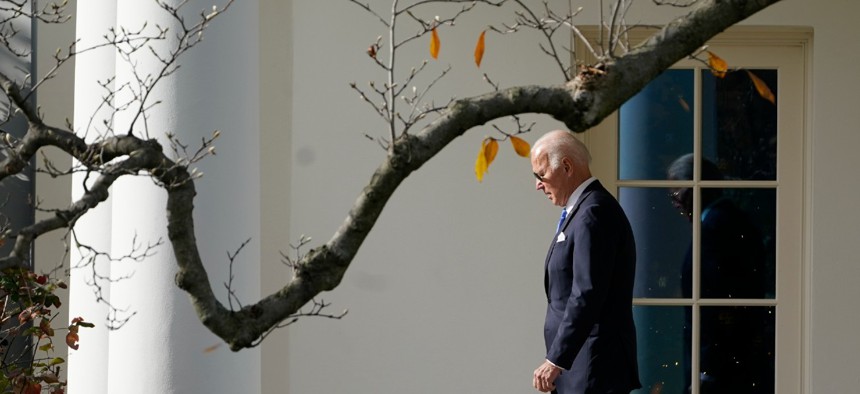Biden Administration Announces More Actions to Help Small Businesses Win Contracts
“This a big step toward leveling the playing field,” said one advocate.
The White House announced on Thursday more actions to help small businesses get involved with federal contracting, particularly by increasing agencies’ accountability and transparency.
President Biden announced in June he seeks to double the share of contracts that go to small, disadvantaged businesses by fiscal 2025 as part of his administration’s goal to narrow the racial wealth gap. Also on November 18, the administration released an outline of its president’s management agenda that prioritizes creating more opportunities for underserved entrepreneurs and all businesses in the federal marketplace. The new actions build on these initiatives.
“The federal government is the largest purchaser of goods and services in the world, buying everything from software and building construction to financial and asset management—making its procurement a powerful tool to advance equity and build wealth in underserved communities,” said a fact sheet from the White House. “Despite this, less than 10% of federal agencies’ total eligible contracting dollars typically go to small, disadvantaged businesses, a category under federal law for which Black-owned, Latino-owned, and other minority-owned businesses are presumed to qualify.”
First off, in order to further the goals outlined in June, the president is asking agencies “to increase their goals, so that governmentwide spending results in 11% of contracting dollars being awarded to small, disadvantaged businesses, up from the current statutory goal of 5%,” said the White House. There are various governmentwide and individual agency goals for awarding contracts to small businesses overall and specific types of small businesses. The fact sheet does not have specific details on how to go about the increase.
Over the next year, the federal government will also revise the goals for the other groups of small business, which include women-owned small businesses; service-disabled, veteran-owned small businesses; and Historically Underutilized Business Zones (HubZones) businesses.
Next, the president announced that for the first time, the administration is releasing disaggregated data on the federal government's spending on contracting by business owner race/ethnicity, which starts with fiscal 2020 data. Topline data “while insightful, offers only a partial illustration of performance in reaching certain groups,” said the White House. “For example, while we typically award roughly 10% of federal contracting dollars to [small, disadvantaged business], in [fiscal] 2020 just 1.7% went to Black-owned small businesses, 1.8% went to Hispanic-owned small businesses, and 2.8% went to Asian American and Pacific Islander-owned small businesses.”
The Office of Management and Budget is issuing updated guidance on the use of category management, an initiative to get agencies to buy as an organized entity as opposed to individually in order to “conduct more equitable buying practices,” said the White House.
OMB is also directing agencies to include progress towards meeting small business goals in the evaluation criteria for performance plans for Senior Executive Service managers who oversee contracting. These plans are “the written summary of work that the individual senior executive is expected to accomplish during the appraisal period and the requirements against which performance will be evaluated,” as described by one agency. “The plan addresses all critical elements and any other performance elements established for the senior executive.”
OMB will also ensure agencies’ small business contracting offices have direct reporting lines to senior leadership.
Finally, the White House announced it’s directing agencies to track the new entrants into the federal marketplace, work to diversify the small business base and make new contracting opportunities more transparent for small businesses to see and apply for.
“This a big step toward leveling the playing field for small businesses to compete for and win federal contracts,” said Jessica Johnson-Cope, chair of Goldman Sachs 10,000 Small Businesses Voices National Leadership Council and a small business owner. “Opportunities for procurement help small businesses generate economic growth in communities across the United States.”
Ron Busby, president and CEO of U.S. Black Chambers, also applauded the move. “For years we've asked 'How can you promise increased spending with Black and minority businesses when you don't know the numbers?’ ” he said in a statement. “We will remain the active voice for small Black contractors to ensure a continued increase in the percentage of contracts they are able to secure, moving forward.”
Sen. Ben Cardin, D-Md., chairman of the Senate Small Business and Entrepreneurship Committee, said “the reforms implemented by the Biden administration will produce economic benefits in some of our most underserved communities for generations to come.”
Separately, the Labor Department announced on Thursday a forthcoming Web portal for covered federal contractors and contractors to certify whether or not they’ve created and maintained Affirmative Action programs. OMB approved this over the summer.
“Covered federal contractors and subcontractors may register on the contractor portal beginning Feb. 1, 2022,” said a press release from Labor’s Office of Federal Contract Compliance Programs. “The portal’s certification features will be available beginning on March 31, 2022, and existing contractors will be required to certify their compliance by June 30, 2022.”




